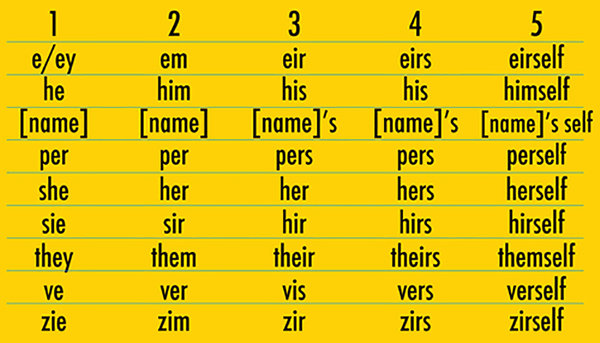“When I was in college, I once requested that my name be spelled ‘Geoffrey’ instead of ‘Jeffrey,’ just because I could,” recounts Vice President and Dean of Admissions Jeff Rickey. Today, Dean Rickey admits that this kind of stunt would be impossible to pull off at SLU. “Everything is electronic, so there’s little room for experimentation like that anymore… your parents would find out immediately!” says Rickey.
How is Dean Rickey’s moment of college rebellion relevant to his current job in our admissions office? Electronic forms that limit how students identify themselves can be more harmful than one might expect. For Dean Rickey, changing the way he spelled his name was more of a silly prank than a serious attempt at redefining himself. For some SLU students, however, having the freedom to change their name or their gender identification might have more profound implications.
On Tuesday, the New York Times broke a story about the trailblazing “gender neutral” policy adopted by the University of Vermont. Beginning in 2009, UVM began the process of officially recognizing a third gender, meaning that a “gender neutral” option was added to the university’s information system. According to the Times, this seemingly simple change “took nearly a decade of lobbying, the creation of a task force of students, faculty members and administers, and six months and $80,000 in staff time to create a software patch.”
UVM was the first university in the nation to offer “ze” as a gender pronoun option on e-documents alongside “he,” “she,” and “name only.” Students may also opt to leave the field blank. In September, UVM again expanded their pronoun options to include “they.” Both “ze” and “they” are common gender neutral pronouns that some individuals might prefer to “he” or “she.”
Such is the case for Rocko Gieselman, the UVM senior profiled in the Times article, who identifies as genderqueer and describes the feeling of being called “she” or “her” as a “kind of nails-on-a-chalkboard” sensation. Although some university documents provide a “fill in the blank” format for students to write in their gender identification, SLU is moving more slowly toward third gender recognition.
“I’ve been a vocal objector to the common application, which now hides behind the federal definition of gender,” says Dean Rickey. As of now, all SLU applicants are still restricted to the common app, where Rickey finds it regrettable that “there’s not an open space for someone to identify differently other than male or female.”
Certainly, the standard information system at SLU does not allow students to identify as “ze,” “they,” or “name only.” Rarely, if ever, are students asked to declare their PGP (preferred gender pronoun) when they introduce themselves in class at the beginning of a new semester. Says Kendrick Fowler ’15, “It doesn’t ever occur to me to ask someone what kind of pronoun they prefer to be called.”
Other SLU students agree that personal gender pronouns other than “he” or “she” are not a common topic of conversation on this campus. Adds Fowler, “I just heard about ‘ze’ for the first time the other day.” Vina Smith ’18 says, “I think gender neutrality might come up in the world outside SLU, but it’s not something we talk about on this campus on a daily basis.”
For the most part, though, students don’t see a problem with incorporating a “third gender” option into SLU discourse and documents. “If our forms recognized a third gender then I think people could feel more welcome here,” says Amanda Kennedy ’18. Adds Kayla Schmalz ’18, “If students don’t identify as one specific gender then it would be unfair for them to have to pick male or female.”
Over the past few years, the university has been exploring gender neutral policies in the realm of residence life. According to Stacey Olney-LaPierre, Associate Director of Residence Life, “A few years ago we switched to the gender neutral housing option for upperclassmen… That’s been really well-received and a seamless transition.” Olney-LaPierre added that the Residence Life Office is “open to” expanding gender neutral living and bathroom options to first year dorms as well.
According to the Times, UVM has laid the groundwork for 100 other schools to “allow students, and sometimes employees, to indicate a moniker other than their legal first name.” Will SLU follow in their footsteps?
Dean Rickey is adamant that the university should not reinforce notions of the gender binary in university documents and publications. Says Rickey, “The academy is a place where there should be great safety and freedom for being who you are and for thinking how you think…It’s really refreshing personally to be involved in a community where at least the aspiration is that people can be identified as they wish.”



